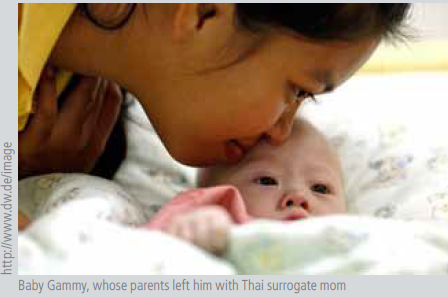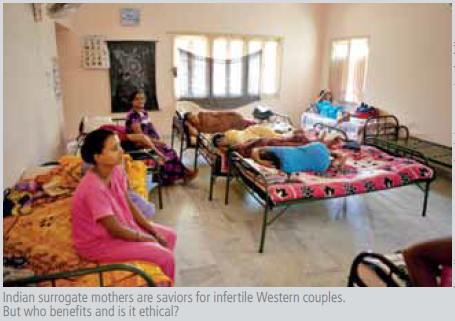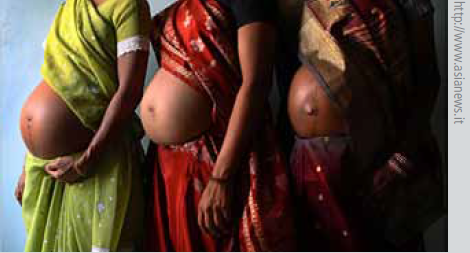The world has been turned into a place where you can do anything only if you have enough money. It seems like your amount of capital determines your social status and creates power. When there is a couple who cannot be pregnant even with proper treatment, they can hire a surrogate mother with monetary exchange. In this way, they can give birth to a baby who looks just like them. Nevertheless, the physical and psychological pain surrogate mothers go through cannot be expressed enough in words. Can it be just to say that their labor for giving birth to children in exchange of money is justifiable?
What is Surrogate Motherhood?
Surrogate motherhood refers to a third person giving birth to a baby for a couple who cannot have a natural birth themselves, perhaps a one or both are sterile. When a couple requests a surrogate birth, sperm and an ovum, or just sperm are injected into the body of a surrogate mother and become fertilized. Unlike adoption, surrogate birth enables the baby to receive genes mostly from his or her own parents. Since people prefer to have babies who look like themselves and wish to feel a sense of kinship, they may choose surrogate birth over adoption. The regulation over surrogate birth differs depending on countries, but it is legal in Thailand, India, Russia, and some states in the U.S. Britain and Canada accept surrogate motherhood without monetary exchange; in other words, only purely voluntary surrogate mothers are acceptable. Europe claims that the right to be pregnant is sacred in the sense that it is given by God, so no one can sell and buy it with money. There is a position supporting surrogate motherhood because it is a win-win strategy where requesters benefit from having babies that look just like them, and surrogate mothers can earn money. On the other hand, some people protest surrogate motherhood with the notion of ‘importance of life’ further explaining that birth is the precious right and blessing allowed for women, but should not be the subject of transaction. They further explain that there is no difference between buying products at a market and people buying babies.
Leaving the pros and cons of surrogate motherhood behind, surrogate motherhood is already legally accepted in some countries and bring some hope for sterile couples. Whether giving birth to a baby through the natural relationship between a couple or by do so as an act of surrogate motherhood, it would be the choice of the woman. In the process of giving birth, it entails all different dangers, pain and then also the psychological strain when a mother gives her baby away to the requester. Nevertheless, if a woman decides to become a surrogate mother regarding all the side effects and troubles she need to go through, her decision should be respected as well. However, it is too hasty to push all of the consequences and problems that may occur for surrogate mothers just because they were ultimately the ones who made the decision. Whether it was society that nudged poor women to make the decision or it is purely the will of women, should be reassessed. Meanwhile, others should ponder upon how to improve poor economic surroundings. The use of surrogate mothers itself can be an unfair contract between the rich and the poor. There have been a couple of incidents which put a spotlight on surrogate motherhood.
Gammy the Abandoned Child
In December 2013, there was a case where a disabled child, Gammy, born to a Thai surrogate mother, was later abandoned by Australian parents. In Bangkok, Thailand, between Australian parents and a Thailand surrogate mother, twin siblings were born. Unfortunately, when the twins became four months old, one of them was diagnosed as having Down’s syndrome, and therefore the Australian parents requested abortion with additional payment of 1600 dollars. However, the surrogate mother, who was a devout Buddhist, decided to give birth to the twin without abortion. After the birth, the Australian parents left with the healthy baby, leaving the ill one behind. The baby Gammy with Down’s syndrome was abandoned just because his poor health condition. Gammy was not only suffering from Down’s syndrome but also congenital cardiac disorder and pneumonia, and had to receive surgery. Upon hearing about this incident, Australian charities started online fund-raising and cumulated about two-hundred thousand and four hundred dollars to contribute in keeping Gammy alive. Considering the Australian requester’s action of abandoning the unhealthy child, might make people think of buying a product in the shop, finding it has a defect and then going back to return it. This whole scenario of abandoning the baby could have been changed if the baby was born by the requester herself. The act of hiring a surrogate mother to give birth to a baby downgrades the sacredness of birth and gives the perspective of considering babies as products, which in turn lowers the dignity of babies.
Who Needs 21 Successors?
Among many cases of surrogate birth, there has been an absurd and bizarre event. On 8th of August 2014, a pregnant woman, whose time was almost due, and nine babies, whose age varied between one month and two years, were found in an apartment in Bangkok, Thailand. Strangely, all these babies had the same biological father. This man with the rumor of being a giant family 2nd generation (children of owners of big companies who are very rich) is a 24 years old Japanese man, named Mistsutoki Shigeta. As the investigation of Thailand police progresses, the number of babies born through surrogate motherhood increased from 9 to 21. There were nine babies with Spanish nationality, as well as others from a number of different nationalities such as Israeli, Swedish, Chinese, and Malaysian. Shigeta’s explanation was that he gave enough financial compensation for each of the surrogate mothers, wanted them to give birth to babies simply because he loves babies, and he needed successors for his business, but all this rational is not very persuasive. There has been skepticism that the babies are the subject of human trafficking. As these two events, of baby Gammy with Down’s syndrome and Shigeta’s 21 babies, caused a stir on the matter of surrogate motherhood, the Thai military government has begun to prepare enforcement of a law banning surrogate birth.
Surrogate Birth and the “Baby factory”
‘Baby factories’ flourishing in Thailand and India, accommodate surrogate mothers for nine months. Surrogate mothers are banned from marital relationship, and on the occasion of medical accident, the hospital, doctor, or requester does not hold responsibility for causing human right problems for the surrogate mothers. In the case of India, surrogate motherhood has been legal since 2002. The industry of surrogate motherhood is a huge business which earns hundreds of thousands of dollars a year and more than thirty thousand babies are born from surrogate mothers every year. In the US one needs to pay one hundred forty thousand dollars for surrogate birth, but it only takes little more than eighteen thousand dollars in the third world, the reason why so many choose expedition surrogate birth.
India’s industry of surrogate motherhood is a newly arising business, and the speed of its growth is also enormous. About a thousand hospitals advertise its medical tour service which through people can come to India and have surrogate birth. Since many countries throughout the world are banning birth through surrogate motherhood, India is earning 2 million 103 thousand dollars from medical tourists. In India, this industry of surrogate motherhood is often referred to as the ‘baby factory.” Rich foreign couples’ sperm and ovum are fertilized, and the fertilized egg is injected into the surrogate mother. Since the genes come from the customers directly, babies’ pupil color, skin color, and even height are all influenced by the requesters, the biological parents.
In the past nine years, the surrogate mother industry center at Akansha hospital produced 680 babies through surrogate birth. Mothers who apply to become surrogate mothers are mostly from poor farmland areas, and these women earn money for the labor and enjoy a life that is much more affluent than before. The expense of surrogate motherhood usually begins from an average of thirty million dollars, and it costs way less even with adequate medical service similar to that of Western country. As the industry of surrogate motherhood becomes very common, the surrogate mothers’ perception of this job has been changing. At the start of the industry, young surrogate mothers felt shame in the thought that they were selling their own bodies and concealing their role from others. On the other hand, now that people have witnessed that many surrogate mothers have climbed up the ladder of social class with huge earnings, it has become a way to gather a great sum of capital. Nevertheless, they are not proud for what they are doing. One woman who once was a surrogate mother claims that she bought a new house and paid for her husband’s surgery. However, she confesses, “Why would I reveal this experience of surrogate motherhood when it does no good to me? I don’t even want to tell my family or relatives. Even though this can be the right decision for each individual, others may not understand.” It is true that surrogate mothers can earn a great sum of money, but this kind of business can damages India’s refutation, begetting social problems within the frame of the baby factory.
The Silent Pain, Surrogate Mothers Bear
A surrogate mother from the Philippines admits that being injected with sperms and an ovum of people she does not know at all and the whole process of being pregnant are not very pleasing or an easy thing to go through. Even after succeeding to become pregnant, she had bad morning sickness and her body became weak. Even after repeated pleading and complaining, the surrogate mother agency showed the affirmative attitude that no extra more money would be provided. After being so ill that she could not work anymore, her salary was reduced, and she had to go to the hospital so often that even with the money paid by the agency, she could not afford the hospital fees.
One of the greatest controversies coming from surrogate birth would be the exploitation of the labor of giving birth. Generally, requesters from rich countries focus on giving birth to a healthy child using a surrogate mother’s body at a cheap price. Through this procedure, it is very easy for surrogate mothers to be downgraded to the means and medium of having children rather than being respected as people equal to the requesters. Conception and pregnancy and the procedure of giving birth to children are not at all light labor. Many surrogate mothers suffer from emotional pain and postpartum depression during the process of giving away their children, who have already bonded. They go through this difficult and harsh labor and suffering, but the agency treats them unfairly, and requesters hurt them again with their actions and look. In order for surrogate birth to be continued, numerous improvements and the problem of human dignity should be resolved.
Surrogate motherhood has been the subject of controversy due to its dark side and negative side effects. Nevertheless, when for inevitable reason surrogate birth should be practiced; stricter regulations, transparent mediate procedure and a just attitude regarding the dignity of surrogate mothers need to be improved in order for this to be a blessing for both sterile couples and surrogate mothers. Above all, instead of treating new born babies as products, people need to act and perceive babies as having a precious existence, valuing life with dignity.








